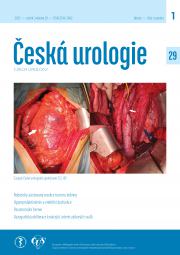Ces Urol 2008, 12(3):199-204 | DOI: 10.48095/cccu2008021
Deflux® v léčbě pokročilých forem vezikoureterálního refluxu u nejmenších dětí
- 1 Urologická klinika 1. LF UK a VFN, Praha
- 2 Subkatedra dětské urologie IPVZ, Praha
- 3 Katedra urologie l. LF UK, Praha
- 4 Klinika dětského a dorostového lékařství 1. LF UK a VFN, Praha
Cíl: Hodnotíme a srovnáváme v prospektivní randomizované studii výsledky léčby vezikou-reterálního refluxu (VUR) vysokého stupně u nejmenších dětí s použitím endoskopické miniinvazivní instilace Defluxu® a konzervativní terapie antibiotickou chemoprofylaxí.
Materiál a metodika: K operační léčbě bylo zařazeno 22 dětí ve věku 1 - 40 měsíců (φ 22,9 měsíců). Deflux® byl instilován pacientům s VUR 3.5. stupně. Konzervativně bylo léčeno 22 pacientů ve věku 1 - 32 měsíců (průměrný věk 13,5 měsíce). V rámci kontrolního vyšetření provádíme videourodynamické vyšetření k posouzení výsledku léčby VUR ve vztahu k funkci dolních močových cest a ultrazvukové vyšetření (vyloučení obstrukce operovaného močovodu).
Výsledky: Hodnoceny byly výsledky endoskopické operační léčby 22 dětí, které byly sledovány 11?24 měsíců. Ve 12 případech (54,5 %) byl VUR vyléčen, u pěti dětí zlepšen na VUR 1. - 2. st. (22,7 %). V konzervativní skupině bylo v uvedeném časovém intervalu vyléčeno pět (22,7 %) a zlepšeny na VUR 1. - 2. st. čtyři (18,2 %) děti. Léčba proběhla bez komplikací, pouze v jednom případě byl po atace pyelonefritidy diagnostikován u operovaného pacienta obstrukční megaureter, který byl léčen krátkodobým zavedením pig tailu.
Závěr: Endoskopická instilace je podle našich zkušeností bezpečnou a účinnou alternativou konzervativní i klasické operační léčby VUR ve všech věkových skupinách s minimem nežádoucích účinků.
Klíčová slova: vezikoureterální reflux, endoskopická transuretrální instilace, antibakteriální chemoprofylaxe, Deflux®
Vloženo: 7. říjen 2008; Přijato: 20. říjen 2008; Zveřejněno: 1. červen 2008
Reference
- Tekgül, S. Vesicoureteric Reflux. In: ESPU Educational Committee Course Book, Praha 2005; 111-115.
- Medical versus surgical treatment of primary vesicoureteral reflux: report of the International Reflux Study Commitee. Pediatrics 1981; 67: 392-396.
 Přejít na PubMed...
Přejít na PubMed... - Tamminen-Mobius T, Brunier E, Ebel KD, et al. Cessation of vesicoureteral reflux for years in infants and children allocated to medical treatment. The International Reflux Study in Children. J Urol 1992; 148: 1662-1669.
 Přejít k původnímu zdroji...
Přejít k původnímu zdroji...  Přejít na PubMed...
Přejít na PubMed... - Elder JS, Peters CA,Arant BS jr, et al. Pediatric vesicoureteral reflux guidelines panel summary report on the management of primary vesicoureteral reflux in children. J Urol 1997; 157: 1846-1851.
 Přejít k původnímu zdroji...
Přejít k původnímu zdroji...  Přejít na PubMed...
Přejít na PubMed... - Birmingham Reflux Study Group. Prospective trial of operative versus non- operative treatment of severe vesicoureteric reflux in children: 5 years observations. Birmingham reflux. Br Med J 1987; 295: 237-241.
 Přejít k původnímu zdroji...
Přejít k původnímu zdroji...  Přejít na PubMed...
Přejít na PubMed... - Janda J. Vesicoureteral reflux - a paediatric view. Proceedings of the International Workshop on Fetal, Neonatal and Paediatric Nephrology and Urology. Eds.Janda, Velemínský, Kočvara, Cataldi, Faculty of Health and Social Cares of the Bohemian South University 2000.
- Matouschek E. Die Behandlung des vesikorenalen refluxes durch transurethrale einspritzung von polytetrafluoroethylenepaste. Urologe 1981; 20: 263-266.
- O'Donell, Puri P. Treatment of vesicoureteric reflux by endoscopic injection of Teflon. Br Med J 1984; 289: 7-9.
 Přejít k původnímu zdroji...
Přejít k původnímu zdroji...  Přejít na PubMed...
Přejít na PubMed... - Läckgren G,Wahlin N, Skoldenberg E, Stenberg A. Long-term followup of children treated with dextranomer/hyaluronic acid copolymer for vesicoureteral reflux. J Urol 2001; 166: 1887-1892.
 Přejít k původnímu zdroji...
Přejít k původnímu zdroji...  Přejít na PubMed...
Přejít na PubMed... - Stenberg A, Hensle TW, Lackgren G. Vesicoureteral reflux: a new treatment algorithm. Curr Urol Reports 2002; 3: 107-114.
 Přejít k původnímu zdroji...
Přejít k původnímu zdroji...  Přejít na PubMed...
Přejít na PubMed... - Kirsch JA, Perez-Brayfield MR, Scherz HC. Minimally invasive treatment of vesicoureteral reflux with endoscopic injection of dextranomer/ hyaluronic acid copolymer: the Children's hospital of Atlanta experience. J Urol 2003; 170: 211-215.
 Přejít k původnímu zdroji...
Přejít k původnímu zdroji...  Přejít na PubMed...
Přejít na PubMed... - Capozza N, Caione P. Dextranomer/hyaluronic acid copolymer implantation for vesico-ureteral reflux: A randomized comparison with antibiotic prophylaxis. J of Pediat 2002; 140: 230-234.
 Přejít k původnímu zdroji...
Přejít k původnímu zdroji...  Přejít na PubMed...
Přejít na PubMed... - Kočvara R, Hanuš T, Dvořáček J, Kříž J. Instabilní detruzor a vezikoureterální reflux (soubor 20 dětí). Čs Pediat 1988; 43: 667-670.
- Capozza N, Lais A, Matarazzo E, et al. Influence of voiding dysfunction on the outcome of endoscopic treatment for vesicoureteral reflux. J Urol 168: 2002; 1695-1698.
 Přejít k původnímu zdroji...
Přejít k původnímu zdroji...  Přejít na PubMed...
Přejít na PubMed... - Dvořáček J, Kočvara R., Kříž J. Ergebnisse der chirurgischen Therapie des vesikoureteralen Refluxes im Kindesalter. Z Urol Nephrol 1987; 80: 467-475.
- Chertin B, Colhoun E, Velayudham M, Puri P. Endoscopic treatment of vesicoureteral reflux: 11 to 17 years of followup. J Urol 2002; 167: 1443-1446.
 Přejít k původnímu zdroji...
Přejít k původnímu zdroji...  Přejít na PubMed...
Přejít na PubMed... - Dahl E,Polacek M,Hagen TS,et al. Endoscopic treatment of vesicoureteral reflux in children. Tidsskr Nor Laegeforen 2007; 127(12): 1032-1035.
- Vandersteen DR, Routh JC, Kirsch AJ, Scherz HC, et al. Postoperative ureteral obstruction after subureteral injection of dextranomer/hyaluronic acid copolymer. J Urol 2006; 176: 1593-1595.
 Přejít k původnímu zdroji...
Přejít k původnímu zdroji...  Přejít na PubMed...
Přejít na PubMed... - Escala Aguirre JM, Retamal Pinto G, Cadena Gonzales Y, et al. Endoscopic treatment with Deflux for primary vesicoureteral reflux. Actas Urol Esp 2007; 31(8): 880-884.
 Přejít k původnímu zdroji...
Přejít k původnímu zdroji...  Přejít na PubMed...
Přejít na PubMed... - Puri P, Pirker M, Mohanan N, Dwarant M. et al. Subureteral dextranomer/hyaluronic acid injection as first line treatment in the management of high grade vesicoureteral reflux. J Urol 2006; 176(4): 1856-1859.
 Přejít k původnímu zdroji...
Přejít k původnímu zdroji...  Přejít na PubMed...
Přejít na PubMed...


